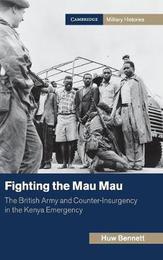
|
Fighting the Mau Mau: The British Army and Counter-Insurgency in the Kenya Emergency
Hardback
Main Details
| Title |
Fighting the Mau Mau: The British Army and Counter-Insurgency in the Kenya Emergency
|
| Authors and Contributors |
By (author) Huw Bennett
|
| Series | Cambridge Military Histories |
|---|
| Physical Properties |
| Format:Hardback | | Pages:317 | | Dimensions(mm): Height 234,Width 155 |
|
| Category/Genre | African history
Revolutions, uprisings and rebellions |
|---|
| ISBN/Barcode |
9781107029705
|
| Classifications | Dewey:967.6203 |
|---|
| Audience | | Professional & Vocational | |
|---|
| Illustrations |
3 Maps; 1 Halftones, unspecified
|
|
Publishing Details |
| Publisher |
Cambridge University Press
|
| Imprint |
Cambridge University Press
|
| Publication Date |
22 November 2012 |
| Publication Country |
United Kingdom
|
Description
British Army counterinsurgency campaigns were supposedly waged within the bounds of international law, overcoming insurgents with the minimum force necessary. This revealing study questions what this meant for the civilian population during the Mau Mau rebellion in Kenya in the 1950s, one of Britain's most violent decolonisation wars. For the first time Huw Bennett examines the conduct of soldiers in detail, uncovering the uneasy relationship between notions of minimum force and the colonial tradition of exemplary force where harsh repression was frequently employed as a valid means of quickly crushing rebellion. Although a range of restrained policies such as special forces methods, restrictive rules of engagement and surrender schemes prevented the campaign from degenerating into genocide, the army simultaneously coerced the population to drop their support for the rebels, imposing collective fines, mass detentions and frequent interrogations, often tolerating rape, indiscriminate killing and torture to terrorise the population into submission.
Author Biography
Huw Bennett is a Lecturer in Defence Studies at King's College London, teaching at the British Joint Services Command and Staff College.
Reviews'Bennett demolishes the myth that the British army fought against the Mau Mau by trying to win the 'hearts and minds of the people'. He shows in unsurpassed detail the ways in which the army used coercion to cow the civil population into capitulation. This book is indispensable to a proper understanding of what happened in Kenya during the Mau Mau emergency.' David French, author of The British Way in Counter-Insurgency, 1945-1967 'In this first document-based study of the wars of decolonisation fought by the British Army after 1945, Huw Bennett provides a gripping, revisionist account of the campaign against Mau Mau rebels in Kenya. Britain's Army, war-weary, over-stretched, under-trained and dependent upon reluctant conscripts, held on to a philosophy of 'minimum force' in Kenya. But on the ground the 'rule of law' was bent, and sometimes broken, as the Army used whatever force it needed. Newly unearthed documents tell a story that shatters our view of Britain's Army as the 'hearts-and-minds' counter-insurgency specialists. This is more than just another colonial history, it is a commentary on the myths we still live by in post-imperial Britain. If you want to know what went wrong in Basra and Helmand, start here.' David M. Anderson, author of Histories of the Hanged: Britain's Dirty War in Kenya and the End of Empire 'Huw Bennett leaves no stone unturned in debunking the self-serving mythology surrounding the role of the British Army in the 'Emergency'.' Morning Star '... Bennett is to be congratulated for an exciting, lively, readable, informed, and scholarly study of Mau Mau that both supplements and complements the growing corpus on British counter-insurgency.' Matthew Hughes, War in History 'Bennett's comprehensive use of previously unseen documents - and, indeed, the weight of this evidence - will silence those who have claimed that Kikuyu oral testimonies are 'untrustworthy' or cannot serve as 'proper' evidence. The same people will argue that abuses carried out by Mau Mau are little mentioned here, but that is not the focus of Bennett's book. This is no sensationalist account of a dirty colonial war, but an exhaustively researched and carefully unpacked indictment of British conduct in one of its perennially difficult colonies. Fighting the Mau Mau is essential reading for anyone concerned with Kenya's history or the decolonization of the British Empire.' International Journal of African Historical Studies 'Offers a careful dissection of the dynamic of the use of force during the insurgency, disassembling the issues surrounding minimum force and the army's behaviour towards civilians the better to put them back together. Locating the study within the 'military phase' of the Kenya Emergency (which lasted from 1952 until the capture of the Mau Mau leader Dedan Kimathi in October 1956), Bennett underlines the decisive role played by the army in quashing the rebellion within what was a relatively short period for a counterinsurgency campaign - although the official end of the emergency only came four years later. The issue at hand, then, is not whether the army was effective in countering the insurgency, but rather how it comported itself.' Michael P. M. Finch, The English Historical Review
|